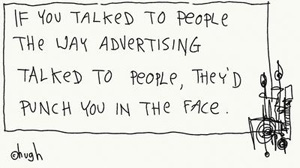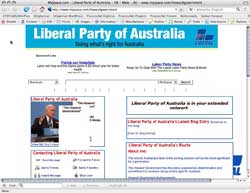Nothing better than spending a rainy Sunday reading some thoughtful articles and listening to raindrops and corellas and koels chattering away — in between arguing with Laurel Papworth, of course! I’ve been reading some stuff Mark Pesce has posted recently, including his own essay Unevenly Distributed: Production Models for the 21st Century, as well as The Register saying that people are tiring of social network websites and a piece explaining why Malcolm Gladwell’s bestselling book The Tipping Point is bullshit. I may reflect upon some of them later.
2007: Social media goes mainstream (except for business and politics)

If 2006 was the year of Web 2.0 then 2007 is the year of social media. For individuals anyway. Australian businesses and politicians generally don’t get it
Social media is mainstream. Two million Australians have Facebook pages and 3.5 million read blogs. MSN Messenger has 7 million users here, and even Ja’mie King says “I’ll MSN u 2nite” without explanation.
But few businesses use social media. Why? I suspect there’s two reasons, apart from an endemic inability to adapt and change. One is about the tools, the other is about business culture.
Continue reading “2007: Social media goes mainstream (except for business and politics)”2007: The (Second) Last TV Election
The next time someone says we’re experiencing Australia’s “first Internet election” or our “first YouTube election”, slap them. Slap them very hard.
Our politicians only see the Internet and the emerging social media as a different kind of TV. YouTube is a place to post commercials, MySpace and Facebook for media releases. Their use of social media is so clueless that geeks attending PodCamp in Perth this Saturday were laughing.
Far from this being the “first Internet election”, it’s more like the The Last Television Election. Maybe the second-last.
Politicians and Social Media: a catalogue of cluelessness
I’ll be in Perth on 27–28 October for PodCamp, the New Media Community UnConference, where I’m presenting a session on Social Media and the Federal Election.
While my first visit to Perth will be fun enough, I’m also enjoying researching my presentation. Australian politicians really don’t have a clue about this stuff.
Starting at the top of the food chain, John Howard’s MySpace profile is a disaster. The screenshot (right) records how it looked this morning — with a a broken rectangle obscuring part of the photo and adverts for the Labor party. Click for the full-size version.
MySpace is the world’s largest and best-known social media operation. Yet this profile doesn’t have anything to offer apart from a recycled media release. No blog entries. Not even any personal information beyond Howard’s age — reminding MySpace’s relatively youthful audience that he’s “old”.
How could John Howard’s personal profile not even mention cricket? If a profile contains even less information than we already know, why would we bother reading it? Why would we bother coming back?
At the other end of the spectrum — in more ways than one! — is Australian Democrats Senator Andrew Bartlett.
Continue reading “Politicians and Social Media: a catalogue of cluelessness”
iYomu: too late to beat Facebook?
iYomu, that “social networking for grown ups” site I wrote about, officially launched today — with US$1M in prize money up for grabs. And I’ve just written an article for Crikey explaining why I don’t think it’ll fly. I also reckon Facebook will win out over MySpace.
My argument in the Crikey article is that the key to success on the Internet is massive, uncontrolled growth. That means attracting a lot of users fast — and then selling out to someone like Rupert Murdoch before it all implodes. The problem is, the very nature of iYomu works against that rapid growth.
World Map of Social Networks
Here’s a map of the dominant social networking websites by country.
I admit, just showing which one has the biggest market share isn’t all that useful unless your worldview only sees things in terms of “the winner” and “all the losers,” but still it’s interesting enough.



